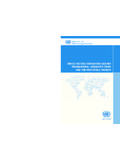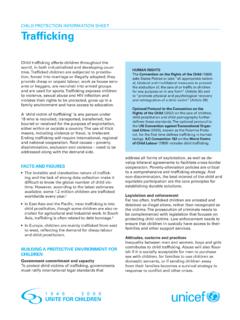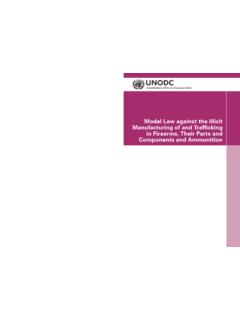Transcription of Evading the Net: Tax Crime in the Fisheries Sector …
1 Evading the Net: Tax Crime in the Fisheries Sector Evading the Net: Evading the Net: Tax Crime in the Fisheries Sector The Fisheries Sector is a large and thriving industry within the global economy, with strategic importance for many developed and developing countries. Worldwide, Tax Crime in the the Sector has an annual value in excess of USD billion, and over 500 million people in developing countries depend, directly or indirectly, on Fisheries and Fisheries Sector aquaculture for their livelihoods. This report looks at the issue of tax Crime in the Fisheries Sector , including frauds over taxes on profit and earnings, customs duties, VAT and social security, with examples from real cases. These include crimes that rely on features characteristic of the Fisheries Sector , as well as those seen in other industries. The report discusses aspects of the Sector that make it vulnerable to tax Crime , including a lack of transparency and difficulty in obtaining beneficial ownership information resulting from the use of offshore companies and the practice of registering vessels under flags of convenience.
2 Strategies used by tax administrations and other authorities to prevent, detect and investigate tax offences are outlined and the report makes recommendations for steps countries can take, alone or in co-operation, to combat these crimes. Table of Contents Executive Summary Introduction How the Fisheries Sector works Tax Crime and other Crime in the Fisheries Sector Combating tax Crime in the Fisheries Sector Conclusions and recommendations Annex: Outline of common documentation Evading the Net: Tax Crime in the Fisheries Sector ORGANISATION FOR ECONOMIC CO-OPERATION. AND DEVELOPMENT. The OECD is a unique forum where governments work together to address the economic, social and environmental challenges of globalisation. The OECD is also at the forefront of efforts to understand and to help governments respond to new developments and concerns, such as corporate governance, the information economy and the challenges of an ageing population. The Organisation provides a setting where governments can compare policy experiences, seek answers to common problems, identify good practice and work to co-ordinate domestic and international policies.
3 The OECD member countries are: Australia, Austria, Belgium, Canada, Chile, the Czech Republic, Denmark, Estonia, Finland, France, Germany, Greece, Hungary, Iceland, Ireland, Israel, Italy, Japan, Korea, Luxembourg, Mexico, the Netherlands, New Zealand, Norway, Poland, Portugal, the Slovak Republic, Slovenia, Spain, Sweden, Switzerland, Turkey, the United Kingdom and the United States. The European Commission takes part in the work of the OECD. You can copy, download or print OECD content for your own use, and you can include excerpts from OECD. publications, databases and multimedia products in your own documents, presentations, blogs, websites and teaching materials, provided that suitable acknowledgment of OECD as source and copyright owner is given. All requests for public or commercial use and translation rights should be submitted to Requests for permission to photocopy portions of this material for public or commercial use shall be addressed directly to the Copyright Clearance Center (CCC) at or the Centre fran ais d'exploitation du droit de copie (CFC).
4 At Photo Credits: Cover Photos Oleh Marchak, Rob Bouwman, Photographerlondon - TABLE OF CONTENTS 3. TABLE OF CONTENTS. ABBREVIATIONS AND ACRONYMS .. 5. EXECUTIVE 7. INTRODUCTION .. 11. Background .. 11. The TFTC and the report Evading the Net: Tax Crime in the Fisheries Sector .. 12. Conclusions and recommendations .. 14. Other related work .. 15. HOW THE Fisheries Sector WORKS .. 19. The value chain in the Fisheries Sector .. 19. Aquaculture .. 22. The relevance of the value chain to a tax examiner or auditor .. 22. TAX Crime AND OTHER Crime IN THE Fisheries Sector .. 25. Tax Crime in the Fisheries Sector .. 26. Specific vulnerabilities to tax Crime in the Fisheries Sector .. 31. Other serious crimes .. 33. COMBATING TAX Crime IN THE Fisheries 35. Raising awareness .. 35. Intelligence gathering .. 36. Tax examination and audit .. 37. Inter-agency 38. International co-operation .. 39. CONCLUSIONS AND RECOMMENDATIONS .. 43. Conclusions .. 43. Recommendations .. 44. ANNEX: OUTLINE OF COMMON DOCUMENTATION.
5 47. Evading THE NET: TAX Crime IN THE Fisheries Sector OECD 2013. ABBREVIATIONS AND ACRONYMS 5. ABBREVIATIONS AND ACRONYMS. AIS Automatic Identification System EFCA European Fisheries Control Agency EU European Union FAD Fisheries and Aquaculture Department FAO Food and Agriculture Organisation of the United Nations FATF Financial Action Task Force FFA Norwegian National Advisory Group against organized illegal, unreported and unregulated-fishing (Fiskeriforvaltningens Analsenettverk). FIU Financial Intelligence Unit GMDSS Global Maritime Distress and Safety System GPS Global Positioning System NS-FIG North Sea Fisheries Intelligence Group NVWA Netherlands Food and Consumer Product Safety Authority OECD Organisation for Economic Co-operation and Development PSC Port State Control RFMO Regional Fisheries Management Organisations STR Suspicious Transaction Report TAG Tactical Analytical Group TFTC OECD Task Force on Tax Crimes and Other Crimes UNODC United Nations Office on Drugs and Crime VAT Value Added Tax VMS Vessel Monitoring Systems VTS Vessel Traffic Services Evading THE NET: TAX Crime IN THE Fisheries Sector OECD 2013.
6 EXECUTIVE SUMMARY 7. EXECUTIVE SUMMARY. The Fisheries Sector is a major global industry, with strategic importance for many countries. In 2010, Fisheries and aquaculture provided fish with a total value of USD. billion. 1 Developing countries are a major participant in this market, providing over 50% of the world fish trade, which contributes a greater amount to their net earnings from foreign exchange than meat, tea, bananas and coffee The Food and Agriculture Organization of the United Nations (FAO) estimates that over 500 million people in developing countries depend, directly or indirectly, on Fisheries and aquaculture for their livelihoods. 3 However, despite these positive statistics, the Fisheries Sector remains vulnerable to organised criminal activity that not only inhibits the ability of countries to enforce Fisheries policy, but directly impacts the economic and social well- being of people in both developed and developing countries. A 2011 issues paper by the United Nations Office on Drugs and Crime (UNODC) focused on the role of large-scale organised criminal groups operating within the Fisheries Sector in the trafficking in persons, the smuggling of migrants and the smuggling of illicit drugs, weapons and illegal tobacco, but found evidence of vulnerabilities to a wide range of organised Crime .
7 4 This report, prepared by the OECD Task Force on Tax Crimes and Other Crimes, looks at the issue of tax Crime in the Fisheries Sector , and the impact this has on the ability of countries to raise government revenue to fund public expenditure and development. Organised Crime is rarely restricted to one sphere, and so a greater understanding of the ways to detect and combat tax Crime , should also have a direct positive impact on the ability of countries to combat other criminal activity. The report begins by looking at the Fisheries Sector as a value chain, identifying the different stages from preparing a vessel before it sets out to sea, to the export of fish and fish products for sale, along with the key participants at each stage. The report examines the different types of tax Crime that countries have identified as connected with the Fisheries Sector , including frauds in respect of taxes on profit or earnings, customs duties, VAT and social security, including examples from real cases.
8 These include categories of Crime that rely more heavily on features characteristic of the Fisheries Sector , such as incorrect declarations as to the origin, volume or categorisation of a catch, as well as offences that are seen in many industry sectors. The report also discusses aspects of the Fisheries Sector that make it vulnerable to tax Crime and other Crime . In particular amongst these are the lack of transparency and the difficulty in obtaining beneficial ownership information, resulting from the prevalence of offshore companies and the practice of registering vessels under flags of convenience in countries other than those of their owners. Finally, strategies available to tax administrations in preventing, detecting and combating tax offences are discussed, including strategies to raise awareness, intelligence gathering, and effective inter-agency and international co-operation, as well an outline of specific country experiences. The annex to the report includes an outline of basic documentation that is produced at each stage of the value chain and which may be used by tax examiners, tax auditors, tax Crime investigators and other government officials in their work.
9 Evading THE NET: TAX Crime IN THE Fisheries Sector OECD 2013. 8 EXECUTIVE SUMMARY. The report concludes that, although there are many individuals and companies operating in the Fisheries Sector that are fully compliant with laws and regulations in the countries in which they operate, the global Fisheries Sector remains vulnerable to a wide range of tax Crime and, taken across all areas of tax, the tax revenue lost to criminal activity in this Sector is likely to be significant. The effect of this tax loss on developing countries may be particularly great, impacting efforts to promote food security, reduce poverty and finance long term development. The report makes the following recommendations. 1. Tax administrations should assess their country's vulnerabilities to tax Crime arising within the Fisheries Sector and related service providers, and the effectiveness of existing legal powers and procedures in preventing, detecting and investigating these crimes. 2. A strategy should be developed for tackling tax Crime in the Fisheries Sector and related service providers within their overall approach to tax compliance.
10 This strategy should: promote voluntary compliance in the Fisheries Sector , including the use of a communications programme aimed at the key stakeholders;. ensure that tax examiners, tax auditors and tax Crime investigators have the relevant skills and knowledge to detect and combat tax Crime in the Fisheries Sector , within the scope of their roles;. improve detection and counter-measures to combat tax Crime in the Fisheries Sector through a whole of government approach, building co-operation with key partner agencies including, inter alia, the customs administration, Fisheries authority and inspectorate, coastguard, police and other law enforcement authorities; and promote international co-operation, including exchange of information, with overseas tax administrations in combating tax Crime and, where appropriate and permitted, the sharing of information received from overseas concerning serious non-tax offences with the relevant government authority or law enforcement authority. 3. In collaboration with other relevant agencies, tax administrations should consider the establishment of regional intelligence working groups, similar to the North Sea Fisheries Intelligence Group established in 2012, to identify greater opportunities for sharing intelligence to combat tax Crime in the Fisheries Sector , and to facilitate efficient and effective exchange of information within applicable laws and regulations.

















